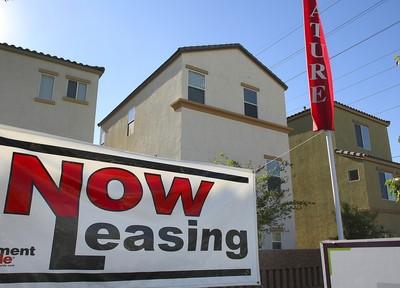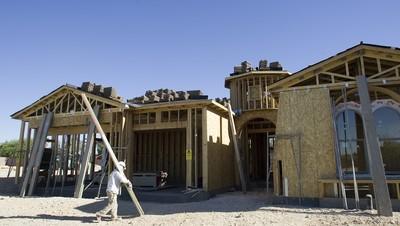STRUGGLING SECTOR: Outlook for housing: Gloomy and likely to worsen
The housing malaise that has spread throughout the nation will probably get worse before it gets better, most analysts agree.
Home sales in Las Vegas are off by 40 percent, prices are falling and builders have cut back dramatically on new home production in an attempt to reduce standing inventory.
Add the subprime lending meltdown to the pot and it leaves millions of Americans at risk of losing their most precious investment. An estimated $1 trillion in adjustable rate mortgages will reset this year, according to the Mortgage Bankers Association.
It's a problem that has hit many housing markets like a brick, particularly areas that had the most rapid run-up in home appreciation. Foreclosure filings are highest in states such as California, Nevada, Florida and Ohio.
Is it is bad as everyone says?
"I walked into the office of the title company I use yesterday and they were down to less than half their normal staff," Robin Camacho of Direct Access Lending said. "People are losing jobs in this market. We'll see a lot of part-time Realtors and mortgage officers leave the business before the market turns around. Experienced Realtors and mortgage officers are surviving, but those with less knowledge or a small network of contacts are leaving for a more steady paycheck."
Camacho said there's not much good news in her local market research.
"The number of new listings is down just a bit. That could be a good sign," she said. "The number of foreclosures and short sales (homes sold for less than what's owed) continues to rise."
Home Builders Research reported that new home sales through May are down 43.8 percent in Las Vegas from a year ago and resales are off by 34.7 percent. Median new home prices have declined 4.4 percent to $308,874 and existing home prices slipped 3.8 percent to $278,000.
Meanwhile, the inventory of homes for sale on the Multiple Listing Service climbed to a record 23,642 in June, with about 40 percent of them sitting vacant.
"It's worse than I thought, considering I wasn't too optimistic in the first place," said Debi Averett of Phoenix-based Housingdoom.com. "Typically, June is rush hour for Las Vegas, as busy as you'd expect, and it's dead. I blame the subprime mess for most of it."
A decade ago, roughly 5 percent of mortgage loan originations were subprime. In 2005, the figure jumped to 20 percent. U.S. foreclosure filings surged 90 percent in May from the same month a year ago, according to Irvine, Calif.-based RealtyTrac.
A jump in foreclosures at a time of year that traditionally is the busiest for home sales means the slide in prices probably isn't over, RealtyTrac Chief Executive Officer Tony Saccacio said.
"Such strong activity in the midst of the typical spring buying season could foreshadow even higher foreclosure levels later in the year," Saccacio said in his monthly report. That will add to the downward pressure on home prices in many areas, he said.
The National Association of Realtors reported a 1.8 percent slide in median home prices in the first quarter as the housing slump enters its second year.
Real estate consultant John Burns said home prices in Las Vegas need to drop by 33 percent, or about $100,000, before the market returns to normal conditions. He shows the housing cost-to-income ratio at 50 percent, meaning people spend half their income on housing. Reno is the same.
The national average is around 30 percent.
Las Vegas' housing market is not yet near the bottom, despite claims from some real estate agents that the worst is behind us, Andrew Pugh of SellFastLV.com said.
Pugh said he's uncomfortable making predictions, but if pressed, he'd have to say we're in for at least a couple of rough years ahead.
"The market is still out of balance and rates have gone up a bit too, which won't help demand," he said.
"I have one house for sale right now for $210,000 on a quarter acre in old Henderson and it's been on the market 30 days or so. It's even slower than I expected. It's pretty bad out there.
"Unless you're buying a low-end property, under $250,000, you're better off renting. A $350,000 house in a good neighborhood can be rented for under $1,500 a month. Right now you can't buy much house for $1,500 a month with a fixed-rate loan."
Home builders have struggled with sales. A blogger on Housingdoom.com reported that Las Vegas-based Signature Homes has given up trying to sell homes in its Town community at Shadow Lane and Alta Drive and is advertising the three-story townhomes for lease. They were originally offered at $250,000 to $280,000.
"We've all been slowing down a bit, but it's been good for us," said Mick Galatio, owner of Desert Wind Homes. "Buyers are getting a lot more attention from the builders. It was different when things were going so fast. That's the good part of the market right now."
Galatio, who founded Desert Wind in 1995, said buyers are able to choose from available inventory and move in right away. They're also getting incentives such as appliance packages, free upgrades, lot premiums and some closing costs paid by the builder.
Desert Wind was averaging 150 to 200 home sales a year, but Galatio said he's looking at about 100 sales this year. Even during these slow times, the company sells at least a couple of homes every month, sometimes three or four, he said.
A recent report from the National Association of Home Builders showed that residential builder sentiment dropped again and is now the worst in 16 years. KB Home, the largest home builder in Las Vegas, laid off 10 percent of its staff last year. Pulte and Pardee have also gone through layoffs, including some key marketing executives.
A source in the home building industry said Pardee will build and sell only model homes at its Vista Cielo subdivision and leave the remaining lots unfinished.
Both KB and Pardee have stopped building at Providence, the master-planned community by Focus Property Group in northwest Las Vegas, the source said.
"The current slump in the housing market continues to impact home builder perception as evidenced by the drop in the NAHB Housing Market Index in June," Hanley Wood Market Intelligence said in its monthly economic analysis.
The index showed that builder confidence reached its lowest levels since February 1991 at a reading of 28. Both new and existing home sales declined in May.
Housing starts also fell as builders may be constructing homes at a more cautious pace.
However, building permits rose in May, suggesting that activity may pick up slightly in coming months. In Las Vegas, permit activity is down 34.4 percent from a year ago to 7,934, Home Builders Research reported.
"We don't expect to see any substantial uptick in new home sales until resales rebound," Home Builders Research President Dennis Smith said. "Another key to better sales velocities is what happens in the lending sector and what kind of responses there are to the subprime mess will be vital."
Houses are still selling, though in fewer numbers than usual, Camacho said. The growing percentage of houses selling for under $269,000 is an indicator that prices are dropping.
Home buyers are still spending to their maximum qualification, so they're getting incredible value for their money right now, she said.
"When buyers are confident that they can buy a home and the value won't drop, they will buy," Camacho said.
"In the past few years we had a lot of casual investors buying up second and third homes. These people aren't buying right now. People are still moving to Las Vegas and they're buying homes to live in. They really aren't concerned about fluctuations in value from day to day, knowing prices rise over time."
Hanley Wood said the main concerns continue to be tighter lending standards from the subprime mortgage fallout, rising yields and higher food and energy costs.
Several structural and economic factors have recently slowed subprime growth and increased delinquencies and foreclosures, economists Faten Sabry and Thomas Schopflocher said in a report for NERA Economic Consulting.
Some of these factors include the rise in short-term interest rates and the decrease in the rate of home price appreciation. Many cities, including Las Vegas, actually have price declines taking place.
Las Vegas ranked among the top four at-risk housing markets in the PMI U.S. Market Risk Index by PMI Mortgage Insurance Co. The others are Phoenix; Riverside, Calif.; and West Palm Beach, Fla.
"If you've followed the media this month, you know that this market has been tapped to be the worst performer in the United States in terms of sales and pricing in 2007," real estate consultant Steve Bottfeld of Marketing Solutions said.
"Thus far, this market is performing at a much higher level than the pundits suggest. What outside observers tend to miss -- and sometimes even local analysts -- is that this market is in the middle of a major transition. Things are changing and we think for the better."
He said Las Vegas is changing from a single-family suburban market to more of a vertical urban market, much like Manhattan did in the early 1900s. Ninety percent of the 14,000 vertical units under construction have been sold, but haven't yet shown up in escrow closings, Bottfeld said.
Averett of Housingdoom.com said a lot of speculators who flooded the Las Vegas market during the glory days are now bailing out.
"You've got a bunch of sellers and not a lot of buyers," she said. "I saw a strong correlation between falling home sales and rising foreclosures in Maricopa County, (Ariz.), and I'll bet you'll see the same for Clark County. Slowing sales, tighter lending standards, rising foreclosures ... it's going to take a while to fix."
As bad as things seem to be in Las Vegas, it could be worse, National Association of Realtors President Pat Combs said during a visit to celebrate construction of a Habitat for Humanity home.
"The good news here is you've got job creation and that's not happening in Michigan," said Combs, who lives in Grand Rapids, Mich. "We're losing jobs. That's a bright star for you."
She said Las Vegas is a great move-up market for buyers because prices are coming down in some areas. Real estate has always been cyclical and even when interest rates were 20 percent, people were making money selling and buying houses, Combs said.
Housing in Las VegasMore Information
NEW-HOME SALES 43.8% RESALES 34.7% MEDIAN NEW-HOME PRICES 4.4% EXISTING-HOME PRICES 3.8%























